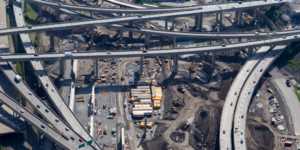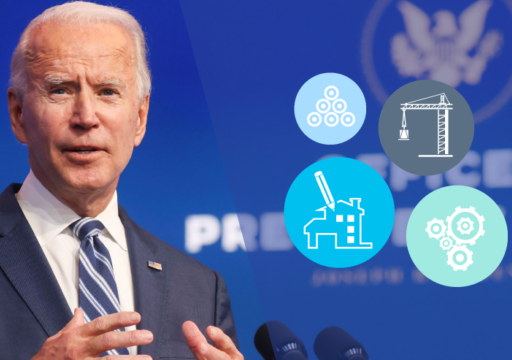
As the federal government approaches a vote on what may be as much as $4.5 trillion of funding for infrastructure and other major social investments, major spending will likely be on the horizon. But as positive as these improvements may be for many, some are concerned that a staggering amount of the new infrastructure spending could be lost to fraud.
The US House of Representatives began negotiations on a $1 trillion infrastructure bill on September 30, 2021, with an additional $3.5 trillion budget bill — which has also been advanced by Democratic leadership and backed by President Biden — likely to follow.

11 Ways President Biden Plans To Impact Construction
Boston University Assistant Professor of Markets, Public Policy, and Law Jetson Leder-Luis noted in a recent piece for The Conversation that even though most government spending goes to its intended avenues, “some of the money will undoubtedly be lost to fraud.”
Though Leder-Luis added that even though the actual number can’t be predicted with any accuracy, he estimated that around 5% of the new infrastructure spending could be lost to fraud — which would amount to a shocking $225 billion.
The high level of government spending that goes to contracting makes this sector attractive for fraud, as a report from the Government Accountability Office noted that close to 15% of government spending goes to contract spending. In 2020, this number came to staggering $665 billion, with the vast majority of spending coming from the Department of Defense.
Leder-Luis points out that the federal government already suffers significant losses to payments it shouldn’t have made, noting that the government’s improper payment rate — “a measure of the amount of money the government shouldn’t have doled out, because of, for instance, duplicate payments or ineligible people receiving payments” — has been a major issue.
“Improper payments totaled $175 billion in 2019,” Leder-Luis continued, “or about 4% of all government spending.”
Leder-Luis notes that information asymmetry — “what happens when the construction company or hospital doing work for the government has more information about what they are billing than bureaucrats do” is a big aspect of what drives government fraud, as “Fraudsters can exploit what they know and the government does not to their benefit by charging more than they should.”
One of the major points of concern with this is that the $1 trillion infrastructure bill may fail to adequately focus on fighting fraud that may come from the spending. According to Leder-Luis, even though language in the bill instructs the government to protect the spending from fraud, it fails to specify exactly how this might be done, while stronger provisions — such as a whistleblowing provision supported by Senator Chuck Grassley — failed to gain inclusion in the bill.
“Improper payments totaled $175 billion in 2019, or about 4% of all government spending.”
– Jetson Leder-Luis, Boston University Assistant Professor of Markets, Public Policy, and Law
Despite unsure nature of future infrastructure spending issues, fraud is more than just an abstract concept
Government infrastructure fraud is more than just an abstract threat for the future: It’s also been the center of existing recent payment disputes.
The West Chester, Ohio-based Contech Engineered Solutions LLC pled guilty to bid rigging in violation of the Sherman Antitrust Act in June 2021, after submitting bids between 2009 and 2018 for North Carolina Department of Transportation (NCDOT) projects in tandem with another company — a process that artificially inflated bids in order to manipulate the selection process with NCDOT.
The guilty plea led the company to pay $7 million in criminal fines alongside $1,533,988 in repayment to NCDOT.
There are also major concerns about different types of fraud elsewhere in government spending, as well: A 2021 study from the University of Texas at Austin’s Department of Finance noted that the Payment Protection Program — a government program meant to help small businesses stay stable during the COVID-19 pandemic — may have lost $76 billion of its $792 billion in spending to fraud.
Though Leder-Luis noted in his commentary that “lawmakers don’t always make preventing fraud a priority,” many elsewhere in government are significantly focused on dealing with these issues.
“The agreement and sentence imposed should serve as a significant deterrent for anyone who chooses corporate greed over open and fair competition in transportation projects funded with federal dollars,” US Department of Transportation Special Agent-in-Charge Jamie Mazzone said of the Contech ruling.
“Together with our law enforcement and prosecutorial partners, we will continue our efforts to pursue and uncover corrupt conduct and hold these bad actors accountable.”
Acting US Attorney G. Norman Acker III added that “This is a case about fraud and collusion…All taxpayers lose when companies submit false records in an effort to game the bidding system.”
Construction fraud is stretching beyond just government spending — and honest contractors may be losing out
As prior Levelset coverage noted, infrastructure fraud has been a major recent issue outside of government work, with 2021 seeing a rash of significant commercial and more localized problems with construction and infrastructure fraud.
An August 2021 report noted that California, Florida, Louisiana, and Texas saw significant amounts of contractor fraud during summer 2021 — leading local governments to take notice.
For example: April 2021 saw an unlicensed contractor in Florida plead guilty to fraud and unlicensed contracting after taking money without starting or completing home construction jobs around the state, leading them to pay a total of $62,820 in restitution to customers they had defrauded.
September 2021 saw one major fraud investigation pay off after nine New York City contractors were charged with bribing New York City Housing Authority supervisors in return for small “micro-purchase” contracts — contracts which do not require multiple bids.
Brooklyn District Attorney Erik Gonzalez said that “These defendants sought to benefit the New York City Housing Authority’s oversight by offering bribes, corrupting the process of ensuring that contracts were awarded fairly.”
NYCHA’s method for using these “microbidding” procedures brings some issues into the process for contractors, making it easier for dishonest actors to engage in fraud and bribery. The code of the NYCHA notes that in the process for getting construction “microbids,” individual contracting officers choose the outcomes in the absence of the bidding process: “no competition is required except that in making purchases below this limit, Contracting Officers must ensure that the noncompetitive price is reasonable and that purchases are distributed appropriately.”
This situation is spurring the NYCHA to make some significant chances, as well.
“To prevent this type of fraud, we have made significant changes to the system, including renewal and modification of purchase monitoring, contract awarding and tracking methods, and post-award contract management,” the organization said in a statement.
“These are all part of our transformation plan. It is being implemented as a department. This is mandated by the 2019 HUD Agreement and we will continue to do the work necessary for improvement.”